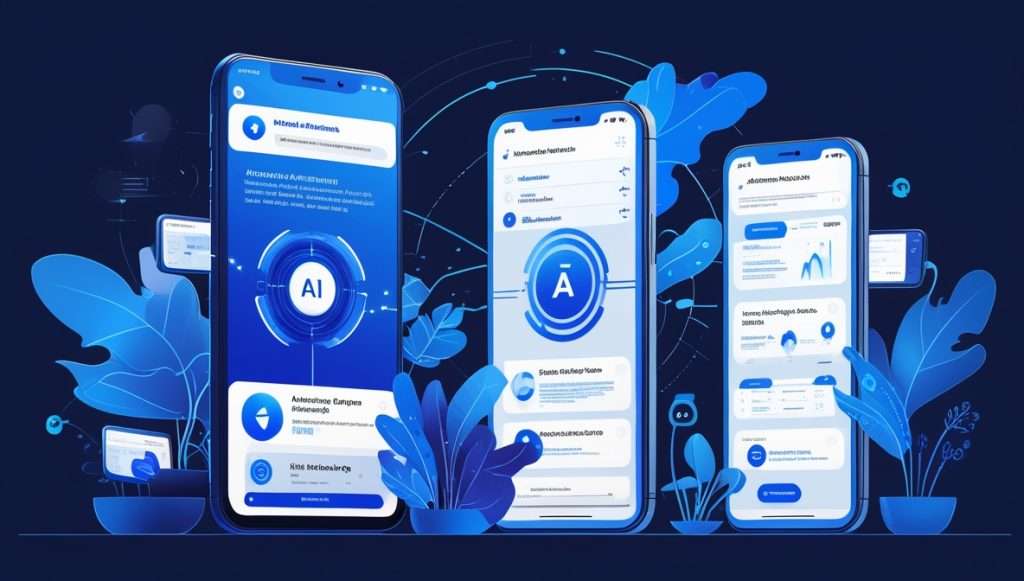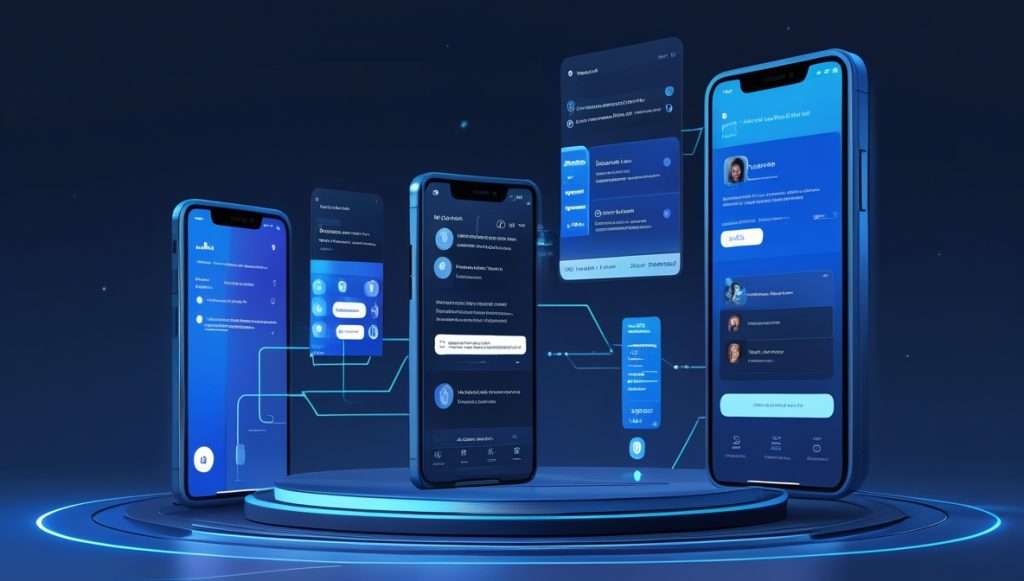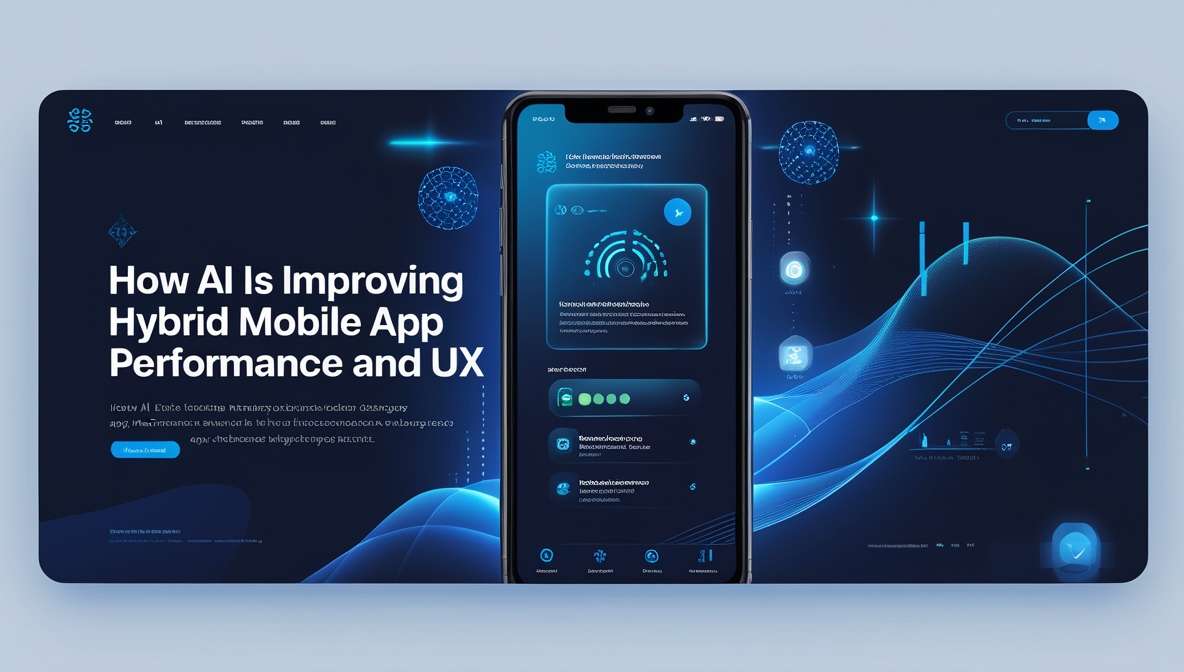How AI is Improving Hybrid Mobile App performance and UX is a question that has gained immense relevance as businesses strive to optimize user experiences. The hybrid mobile app industry undergoes transformation through AI technology which delivers enhanced performance along with better user engagement alongside adaptation capabilities. Hybrid apps powered by AI functions become more smart and fast and more intuitive and provide users with continuous seamless interactions across all devices and platforms.
AI’s Role in Enhancing Hybrid Mobile App Performance

From the Hybrid Mobile App Performance, The usual sluggish performance of hybrid mobile apps compared to native apps persists because of speed-related issues and unresponsive control problems. The current technological advancements with AI systems enable performance improvement through its automated algorithms. AI tools analyze user data in real-time to execute efficient functionality adjustments which boost hybrid applications’ operational speed. Machine learning models detect app crashes and enhance resource allocation and application speed by optimizing background application work cycles. Hybrid apps provide native application-level performance because of this feature.
AI-Powered Caching and Load Balancing
AI-powered caching systems determine popular content to store locally for quicker access which speeds up user app experience through reduced load times. The performance issues in hybrid mobile apps mainly stem from their frequent need to contact servers. The analysis of user patterns by AI algorithms enables important data preprocessing for applications which ensures proper operation when network connection is weak.
AI system management optimizes server request processes which reduces repetitive data transmissions along with improving operational speed. AI-powered load balancing uses performance algorithms to distribute network traffic uniformly among servers which protects against data overcrowding and delivers seamless experiences to users. Users obtain faster feedback and encounter fewer server outages because of this solution which makes hybrid applications more dependable.
Predictive Maintenance and Performance Optimization
Through AI the system detects upcoming performance problems thus preventing system crashes as well as providing users with a smooth application experience. The inefficient management of resources leads Hybrid apps to experience unexpected crashes together with performance slowdowns. AI predictive tools actively track app functionality through performance monitoring that examines error reports to discover upcoming problems that could impact user experiences.
The identification system allows developers to fix software problems before they need repair thus preventing operational disruptions to the app and enhancing reliability. The detection of unneeded background processes allows AI to manage memory better which results in automatic termination of these processes. The execution of hybrid apps remains smooth across devices with low processing power because this feature optimizes their performance.
Smart Data Processing for Improved Speed
Real-time processing of extensive data quantities by AI systems leads to quicker response times that benefit users. Large-scale data management presents a primary difficulty during hybrid mobile app development because it requires optimal speed performance. Modern data processing systems using artificial intelligence analytics function to optimize information evaluation while improving search and presentation times of content.
Hybrid apps leverage AI data processing capabilities for both structured and unstructured data to provide targeted user experiences that avoid system performance issues. The combination of quick response and timely relevant content delivery happens because of this feature.
AI’s Impact on User Experience in Hybrid Mobile Apps

In The Hybrid Mobile App Performance, Any mobile application succeeds or fails based on how well users experience it through UX. The introduction of AI has started a UX revolution for hybrid mobile apps resulting in increased interactivity as well as intuitive design and more personalized features. AI-powered personalization alongside automation enables hybrid apps to learn from user preferences allowing them to anticipate needs and deliver smooth navigation. The combination of modern advancements produces an excellent user experience that benefits users through multiple application platforms.
AI-Driven Personalization for User Engagement
Computing technologies study user activities together with individual choices to show customized material which drives user engagement and keeps people active. Hybrid apps keep users through personalized experiences that AI allows them to create according to individual user preferences. AI algorithms analyze user interactions as they suggest relevant content while reshaping the application interface according to how users behave.
User needs guide how the application operates through its intelligent design which results in a natural and responsive experience for each user. Virtual assistant technology combined with AI-driven chatbots boosts user interaction because they offer immediate support services. The systems can process natural language thereby enabling human-like and efficient communication during interactions.
Natural Language Processing (NLP) for Voice and Text Interactions
The incorporation of artificial intelligence powered NLP techniques improves both text and voice interactions thus creating hybrid apps that are easier to use by all users. The ability of hybrid applications to interpret and answer user inputs in conversation stems from Natural Language Processing (NLP). Through AI technology voice assistants empower users to browse applications without hand movements thus making programs more accessible to disabled persons as well as providing better general functionality. The advanced text analysis capabilities of AI systems improve how chatbots deliver responses by giving users precise answers that relate directly to their questions. The result of this approach leads to satisfied customers who choose to stay with the application.
Intelligent UI/UX Adaptation
The system utilizes AI algorithms to modify user interface components through interaction data which results in a seamless and aesthetically pleasing interface. The success rate of an app strongly depends on its user interface design quality. AI-driven UI adaptation modifications user interface elements including layout structure together with control positions and graphical user interface color choices in accordance with individual user choice preferences.
AI monitors user interaction levels to modify the application layout which improves user interface beauty and usability. AI actively helps user experience through its ability to detect difficult accessibility points and implement adaptive solutions targeted at enhancing accessibility. The design of hybrid applications supports users from different populations who need different usability requirements.
AI-Powered Security Enhancements for Hybrid Apps

From The Topic of Hybrid Mobile App Performance, The broad implementation scope of hybrid mobile applications produces insecurity because these apps support multiple platforms which makes them targetable by cyber threats. Through its analysis of anomalies AI prevents security breaches but provides fraud prevention and safeguarded data protection to applications. Hybrid applications that use AI security technology protect user data and keep privacy regulations in check. Such security measures help establish confidence in users who ultimately support a secure application base.
AI-Based Threat Detection and Prevention
Through real-time monitoring AI detects abnormal activities which prevents both cyber security threats and data breaches. Security problems affecting hybrid apps include unauthorized entry and breaches of user data. Permanent AI threat detection platforms track program activities to identify abnormal behavioral patterns that reveal potential cyber assaults.
Strong security measures unfold through machine learning algorithms which forecast security threats to keep information secure. AI prevents fraudulent payments by studying purchase habits to spot irregular transactions patterns. The financial security of app transactions improves as a result of protective measures that decrease the likelihood of fraudulent activities.
Biometric Authentication for Enhanced Security
Artificial Intelligence authentication technologies enable users to confirm their identity more precisely which results in less access penetration for unauthorized parties. Standard mobile application security now features fingerprint scanning and voice authentication and facial recognition as default options. AI provides support to biometric authentication systems by increasing detection accuracy and spotting those who try to deceive systems.
Users enjoy secure and easy access through hybrid apps when these systems use AI-based biometric security authentication. The modern system uses advanced security measures which eliminate the requirement for complicated passwords while providing complete data defense through a convenient framework.
AI-Driven Encryption and Data Privacy
The implementation of AI brings data protection through encryption and privacy compliance that stops unauthorized users from accessing stored information. AI encryption algorithms receive increasing importance among app users because they protect sensitive data securely. AI examines data pattern movements to maintain encrypted conditions for personal information from its initial distribution point to its final data storage period.
Businesses benefit from AI because it helps them fulfill data protection requirements for GDPR and CCPA standards. The automated system for compliance monitoring which AI provides helps protect users from legal issues while establishing greater trust in hybrid applications.
Conclusion
How AI is Improving Hybrid Mobile App performance and UX is evident in its ability to enhance speed, personalization, security, and overall user experience. The combination of AI innovations creates new bridges between hybrid and native apps thus improving the speed performance and security as well as the user-friendly elements of hybrid applications. Businesses achieve a better long-term position in the digital world through competitive advantage by merging AI technology with their hybrid app development plans.

